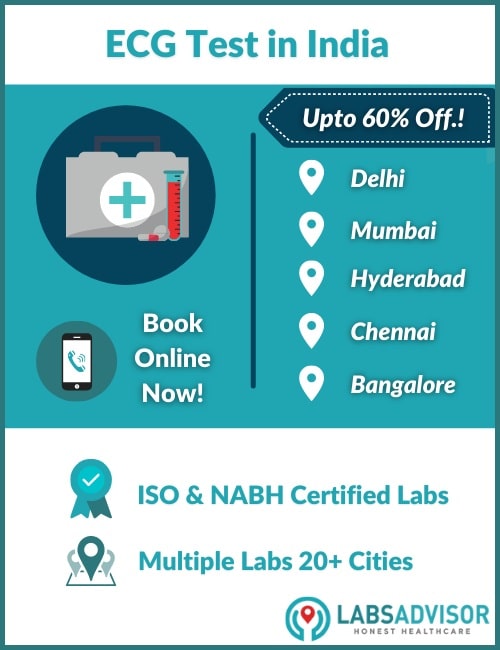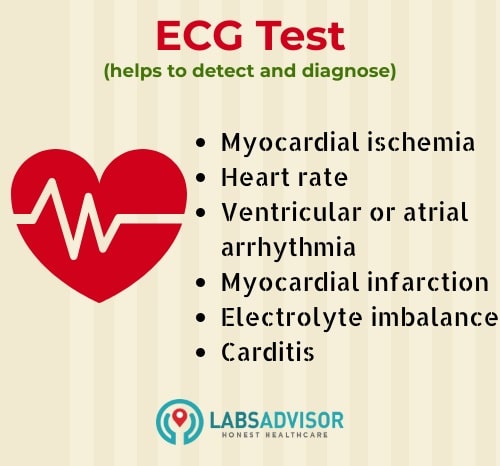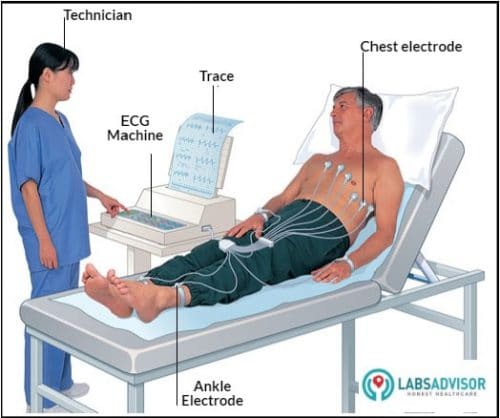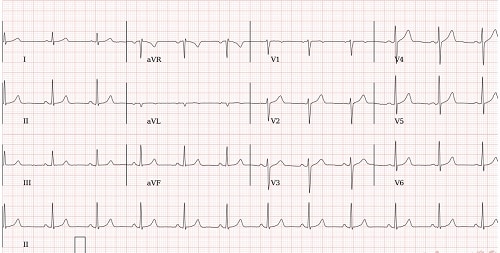
Electrocardiogram, most commonly known as an ECG test is done to examine the heart by measuring the electrical signals.
Book this really important test at your local top-quality labs through us at up to 60% discount. The lowest ECG Test Price is ₹150 only.
ECG Test Through LabsAdvisor
|
Price of ECG Test in Indian and Lab Details
We offer the ECG test in over 20 Indian cities. Click on the link of your city below to choose a lab and make an online booking for home collection at a suitable time.
| Cities for ECG Test | Prices starting from |
| ECG Test Cost in Gurgaon | ₹150 |
| ECG Test Cost in Noida | ₹210 |
| ECG Test Cost in Delhi | ₹150 |
| ECG Test Cost in Mumbai | ₹212 |
| ECG Test Cost in Chennai | ₹209 |
| ECG Test Cost in Bangalore | ₹170 |
| ECG Test Cost in Hyderabad | ₹160 |
| ECG Test Cost in Other Cities of India | ₹150 |
Know the ECG test cost at home offered by all the labs across Delhi with prices starting at ₹720 only and avail of up to 10% exclusive discount by calling us on the below number.
ECG test price in Delhi
The price of the ECG test starts at just ₹130. The following are some of the labs offering the ECG test in Delhi.
- Apollo Clinic
- Bharat X-Ray Clinic
- Indian Diagnostic Centre
- Dr. Sarwan Diagnostic Lab
- Sanjeevani Dwarka Path Labs
- Mahajan Imaging
- Neuro Imaging
- Star Care
- Premium Clinic
- Advance Diagnostic Centre
To check the lowest ECG test price in the lab near you and book your appointment, click here ECG in Delhi.
ECG charges in Mumbai
The charges of the ECG test in Mumbai vary between ₹212 and ₹360 depending upon the lab and location. The following are some of the labs offering the ECG test in Mumbai.
- Suburban Diagnostics
- Proscan Diagnostics
- Neptune Diagnostics
- Top-Rated Lab
- Apollo Spectra
Check ECG in Mumbai to know the ECG charges in the lab near you and book your appointment.
ECG cost in Bangalore
The cost of the ECG test in Bangalore varies from ₹170 to ₹320 depending upon the lab. You can also check ECG in Bangalore to know the lowest ECG test cost offered in the lab near you and book your appointment. The following are some of the labs offering the ECG test in Bangalore.
- Asian Diagnostics
- Aarthi Diagnostics
- Apollo Clinic
- Apollo Spectra
- Focus Imaging
- Rashi Diagnostics
ECG test cost in Hyderabad
The ECG test cost in Hyderabad starts at just ₹160. The following are some of the labs offering ECG tests in Hyderabad.
- Apollo Clinic
- Aarthi Scans
- Vista Diagnostics
- Lucid Medical Diagnostics
- SRL Diagnostics
Click here ECG in Hyderabad to know the lowest ECG test cost in the lab near you and book your appointment.
Cost of ECG test in Chennai
The cost of the ECG test in Chennai ranges between ₹130 and ₹320. The following are some of the labs offering the ECG test in Chennai.
- Apollo Clinic
- Apollo Spectra
- Primex Lab
- Aarthi Scans
- Medall Care Centre
To know the lowest cost of the ECG test in the lab near you and book your appointment, click here ECG in Chennai.

What is an ECG test?
Electrocardiogram, most commonly known as an ECG test is done to examine the heart by measuring the electrical signals. It is done to measure the electrical activity of your heart in order to check any abnormality related to the heart. A body’s natural electrical system causes the heart muscle to contract. This pumps blood through the heart to the lungs and to the rest of the body. When the electrical system doesn’t work perfectly, many different heart conditions can occur.
The ECG shows the heart’s electrical activity as line tracings on paper. The spike and dips on the tracing are called waves. These wave patterns help your doctors identify abnormalities.
An ECG test is also abbreviated as an EKG test.
What are the different types of ECG?
The various types of ECG tests are:
- Resting 12-lead ECG: This is the most common type of ECG. Small sticky patches called electrodes are placed on the patient’s chest, arms, wrists, and ankles. These electrodes are connected to a machine that records the heart’s electrical activity from 12 different views. The patient has to lie very still and quiet. The test takes approximately 10 minutes. It will determine if there is any abnormal conduction through the heart when the patient is at rest.
- Exercise ECG (Stress test): It is also called a treadmill test or TMT. The patient is made to walk on a treadmill or ride a stationary bicycle. ECG is recorded before and during the exercise to check for changes in the heart while he exercises. Sometimes ECG abnormalities can only be seen during exercise or while symptoms are present. This test is used to detect coronary heart disease or to determine the safe level of exercising following a heart attack. Click here to check out our complete guide to the Treadmill Test or TMT in India.
- Holter Monitor: A Holter monitor is used to monitor the ECG tracings continuously for 24 hours or longer. When resting ECG or stress ECG fails to diagnose certain symptoms such as dizziness, fainting, low blood pressure, or prolonged fatigue; your doctor may request an ECG tracing to be run over a long period of time. Holter ECG allows a better opportunity to capture any abnormal heartbeats that may be causing problems. It is also used to monitor critically ill patients or patients undergoing general anesthesia. Click here to check out our complete guide to the Holter Monitor Test in India.
- Event Monitor: It is similar to the Holter monitor as the electrodes are attached to your chest all the time. While the Holter monitor measures your ECG continuously, the event monitor will record ECG only when you press the trigger button. When you feel one or more symptoms such as chest pain, dizziness, or palpitations you just push a button on the event monitor. It will start recording your heart’s electrical activity.
- Signal-Averaged ECG: It is a more detailed type of ECG. During this procedure, multiple ECG tracings are obtained over a period of twenty minutes to capture abnormal heartbeats that may occur intermittently.
- Cardio-Pulmonary Exercise Test (CPET): It is done to evaluate the functioning of the heart and lungs at rest and during exercise. Cardiopulmonary exercise testing machine using a stationary cycle or a treadmill. A non‐rebreathing valve is connected to a mouthpiece with continuous ECG and blood pressure monitoring. CPET involves measurements of respiratory oxygen uptake (Vo2), carbon dioxide production (Vco2), and heart activity during a symptom‐limited exercise test.
Why is an ECG test done?
Your doctor may advise you an ECG if you have one or more of the following symptoms:
- High blood pressure
- Abnormal chest pains
- Irregular or heavy heartbeats
- Shortness of breath
- Family history of heart disease
- Diabetes
It is also recommended in case if you want to start exercising or if your doctor hears an unusual sound while listening to your heart or as a part of a pre-operative assessment before a surgical procedure.
What does an ECG test measure?

An ECG test is a primary tool for the diagnosis of many heart problems. The ECG may be done to measure:
- The electric axis of the heart: The accurate determination of the electrical axis of the heart is useful in the diagnosis of various heart problems.
- Heart rate: Heart rate is the number of times a heart beats in a minute. The regular heart rate of a male should be between 60 and 80. For an average female, it is between 70 and 90. A heart rate of more than 100 is considered unhealthy.
- Ventricular or Atrial arrhythmias: An arrhythmia is an abnormality or disturbance in the rhythm or rate of the heartbeat. Arrhythmia is caused by a problem with the heart’s electrical system. The electrical system initiates a heartbeat and sends electrical impulses through the heart. Arrhythmias can range from simply annoying but not dangerous to those that result in significant cardiac symptoms or loss of consciousness. Increase in wall thickness or size of the atria and ventricles.
- Myocardial infarction and myocardial ischemia: While myocardial ischemia is identified as a decrease in blood supply to the heart tissue which leads to chest pain, myocardial infarction is the endpoint of this ischemia that results in the death of heart tissue due to the absence of blood supply
- Electrolyte imbalance: Electrolyte carries a charge and is essential for life. An electrocardiogram is an extremely sensitive method of detecting an imbalance in calcium and potassium levels.
- Carditis: Carditis is the inflammation of the heart or its surroundings.
- Pacemaker monitoring: When heart patients with implanted pacemakers undergo electrocardiogram testing, a cardiologist will be able to detect the presence and effects of the pacemaker.
Is there any preparation required before the test?
There is no special preparation required for an ECG test. But avoid using oily or greasy skin lotions on the day of the test as they can prevent the electrodes from making contact with your skin.
How is an ECG test performed?
For an ECG test, you might be asked to change into a hospital gown. You will be made to lie on your back on a table. The technician will attach 12 to 15 soft electrodes with gel to your chest, arms, and legs. These electrodes are attached to electrical wires that are attached to the ECG machine.
You need to lay very still while the machine records your heart’s electrical activity. These recordings will be mapped to a graph or plain paper. You should not talk while the test is in process. The test will take around 10 minutes. After the test, the electrodes are removed and discarded.

Are there any risks in the test?
An ECG simply monitors the electrical activity of your heart. The electrodes attached to the chest do not emit any electricity hence it is completely safe. Some people may experience skin rash at the area where the electrodes are placed but that goes away without any treatment.
People undergoing stress ECG may have a slight risk of getting a heart attack but that is related to exercise not ECG.
How long does it take to get the test reports?
You can collect your ECG results immediately. Your cardiologist will go over the result with you. If some abnormality is seen, you might be advised with further tests.

We have also written detailed blogs on other heart tests such as Echo, stress MPI test, and coronary calcium scan. Click on the links below to know more about them.







Get the lowest ECG test price near you by calling us at
☏+918061970525
If you want us to call you back, click on the link below